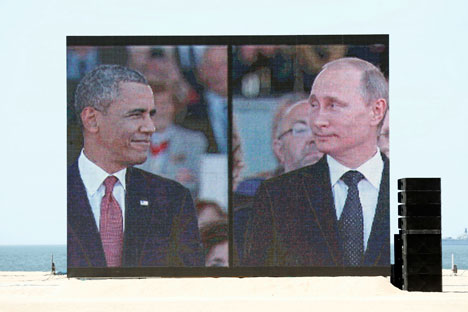
Both Russians and Americans rely on television as their news source. Source: Reuters
North Myrtle Beach, South Carolina – In the beach town where my parents live, it’s not at all unusual to be asked by salespeople or waiters: “Where are you visiting from?” Almost no one checking out at the supermarket or getting a table at the pancake house is local – especially at the end of July.
The first time I was asked that question this summer, I was a little apprehensive about responding, “Well, actually, I live in Russia.” I arrived in the U.S. for my annual vacation the day Malaysian Airlines flight 17 was shot down over eastern Ukraine and the tragedy had featured prominently on the news. But the first time I told someone that I was visiting from Moscow, the reaction was rather muted. “Oh, that’s interesting,” the store clerk said. “Are you in the military?”
I actually got that particular reaction several times in the first week I was in South Carolina. But there are two major military bases not far from where my parents live, and it’s likely that most people coming to this beach from exotic destinations are in fact members of the armed forces.
The other reaction, which I got from two friends I met during my time here, was a little less easy to explain. “Oh,” said my friend the lawyer, “there’s a lot going on over there right now. I mean, not only in Ukraine but also in the Middle East.” I must have had a puzzled look on my face as I tried to determine where she was going with this line of thinking because she continued: “I mean, I know they’re not in the same place, but….”
My friend wasn’t sure exactly where she was going with this line of thinking either, but somehow in her mind the violence in Ukraine and the conflict between Israel and the Palestinians in Gaza were connected. I didn’t think much about this conversation until a few days later, when an acquaintance who is a doctor said almost exactly the same thing.
Why, I wondered, would two highly educated professionals who obviously knew that what was going on in Ukraine was quite different and distant from what was going on in Gaza connect the two stories? I came upon a possible answer as I sat down later in the week with my parents to watch the evening news. The latest reporting from Gaza led the newscast, with updates on MH17 in the second slot. The reports were not at all linked, but it was possible to see how a casual viewer could lump it all into the category of “some violence going on over there.”
According to a Gallup poll conducted last summer, 55 percent of Americans get their information about current events from TV news, and my doctor friend admitted that the evening news was her main source of information about international affairs, so as in Russia, the appearance of the story in the nightly television news and its positioning were highly relevant to the way ordinary people with no ties to the country view it. This realization was a little sobering for someone working as a print and online journalist.
One of the most important things I do during my vacation is read local U.S. papers and watch the local news. It helps me put my work covering Russia for a foreign audience in perspective, and never in my time living in Russia has this change of perspective been so important as right now. Most years when I visit the U.S., I think that no one I meet cares about what is going on in Russia because not much relevant is going on. This year, however, when Russia seems to me to be at the center of every news story, I was steeling myself to discuss some tough questions about the country. They didn’t come up. Not even when I volunteered that instead of being in the military, I in fact worked as a journalist.
One night, the teaser for the evening news came on. “Tonight at 11,” the voiceover said, “find out how sanctions against Russia could affect you.” I stopped what I was doing and stared at the TV. How, I wondered, could sanctions against Russia possibly affect the local community of North Myrtle Beach, SC? The voiceover continued: “Find out how high prices of Russian ammo may go and why AK-47s may become a hot commodity.”
The lesson of the summer seems to be one that I learned a long time ago – know your audience and, for any story you cover, find an angle to make it relevant to them. Forty-two percent of South Carolinians own guns and the state ranks 15th in the country in the latest Guns and Ammo listing of best states for gun owners. Kudos to WBTW channel 13 for teasing this out. I made a mental note to do some geo-targeting of RBTH Facebook ads giving more exposure of our defense and military history sections to readers in the American South.
All rights reserved by Rossiyskaya Gazeta.
Subscribe
to our newsletter!
Get the week's best stories straight to your inbox